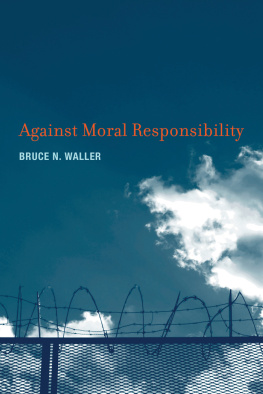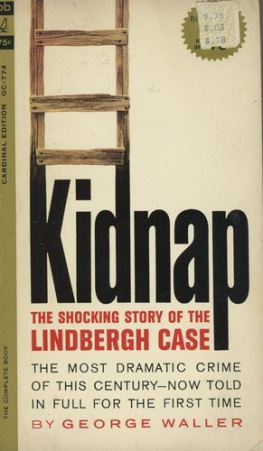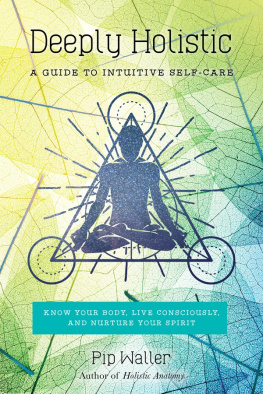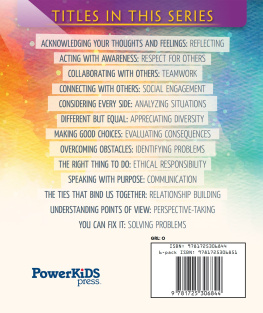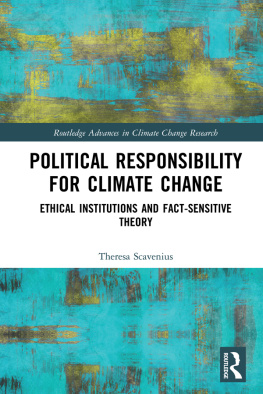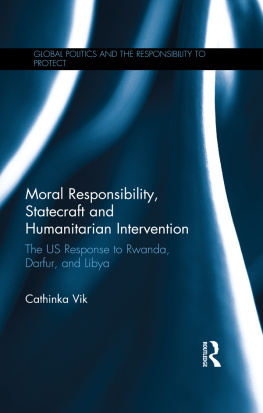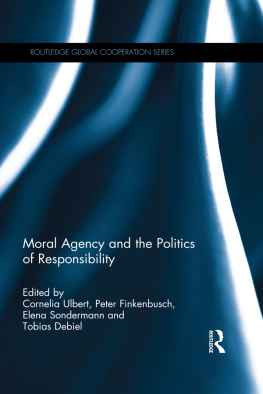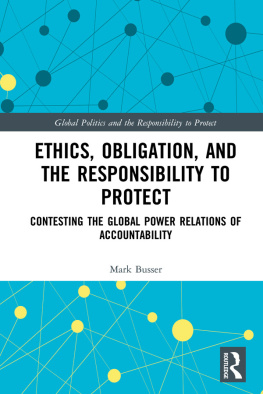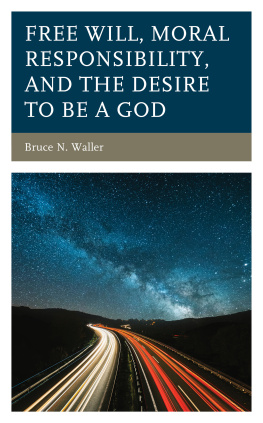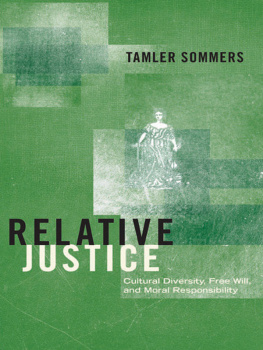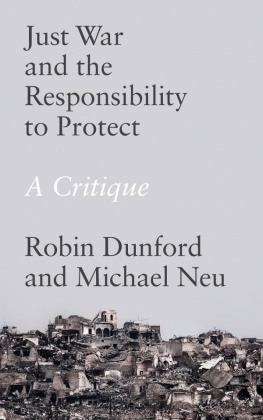Waller - Against Moral Responsibility
Here you can read online Waller - Against Moral Responsibility full text of the book (entire story) in english for free. Download pdf and epub, get meaning, cover and reviews about this ebook. City: Cambridge;Mass, year: 2012;2011, publisher: MIT Press, genre: Science. Description of the work, (preface) as well as reviews are available. Best literature library LitArk.com created for fans of good reading and offers a wide selection of genres:
Romance novel
Science fiction
Adventure
Detective
Science
History
Home and family
Prose
Art
Politics
Computer
Non-fiction
Religion
Business
Children
Humor
Choose a favorite category and find really read worthwhile books. Enjoy immersion in the world of imagination, feel the emotions of the characters or learn something new for yourself, make an fascinating discovery.
Against Moral Responsibility: summary, description and annotation
We offer to read an annotation, description, summary or preface (depends on what the author of the book "Against Moral Responsibility" wrote himself). If you haven't found the necessary information about the book — write in the comments, we will try to find it.
A vigorous attack on moral responsibility in all its forms argues that the abolition of moral responsibility will be liberating and beneficial.
Waller: author's other books
Who wrote Against Moral Responsibility? Find out the surname, the name of the author of the book and a list of all author's works by series.
Against Moral Responsibility — read online for free the complete book (whole text) full work
Below is the text of the book, divided by pages. System saving the place of the last page read, allows you to conveniently read the book "Against Moral Responsibility" online for free, without having to search again every time where you left off. Put a bookmark, and you can go to the page where you finished reading at any time.
Font size:
Interval:
Bookmark:
Against Moral Responsibility
Against Moral Responsibility
Bruce N. Waller
The MIT Press
Cambridge, Massachusetts
London, England
2011 Massachusetts Institute of Technology
All rights reserved. No part of this book may be reproduced in any form by any electronic or mechanical means (including photocopying, recording, or information storage and retrieval) without permission in writing from the publisher.
For information about special quantity discounts, please email .
This book was set in Stone Sans and Stone Serif by Toppan Best-set Premedia Limited. Printed and bound in the United States of America.
Library of Congress Cataloging-in-Publication Data
Waller, Bruce N., 1946
Against moral responsibility / Bruce N. Waller.
p. cm.
Includes bibliographical references and index.
ISBN 978-0-262-01659-9 (hardcover : alk. paper)
ISBN 978-0-262-29807-0 (retail e-book)
1. Responsibility. 2. Ethics. I. Title.
BJ1451.W275 2011
170dc22
2011010112
10 9 8 7 6 5 4 3 2 1
Preface
Against Moral Responsibility is an assault on the moral responsibility system: a system that is profoundly entrenched in our society and its institutions, deeply rooted in our emotions, and vigorously defended by philosophers from Aristotle to the present day. Such an assault might seem foolhardy, or at best quixotic. But in fact, the results from extensive psychological, sociological, and biological studies have caused major problems for defenders of moral responsibility, and there are serious flaws in the moral responsibility system. Furthermore, the philosophical defenders of moral responsibilitythough they are numerous, imaginative, insightful, and committedare in no position to offer a unified defense of the moral responsibility citadel. Instead, in their reactions to the scientific advances challenging the moral responsibility system, philosophers have proposed a great variety of different and conflicting defenses of moral responsibility. There is such controversy among the defenders of moral responsibility that moral responsibility abolitionists might carry the day by sitting back safely while the defenders demolish one anothers arguments.
The basic claim of this book is thatall the extraordinary and creative efforts of contemporary philosophers notwithstandingmoral responsibility cannot survive in our naturalistic-scientific system. Moral responsibility was a comfortable fit among gods and miracles and mysteries, but the deeper scientific understanding of human behavior and the causes shaping human character leaves no room for moral responsibility. The second claim is that when we look carefully at the moral responsibility system and at what would actually remain when that system is abolished, it is clear that what we really wantnatural nonmiraculous human free will, moral judgments, warm and meaningful personal relationships, creative abilities, and the opportunity to make our own decisions and exercise effective controlcan survive and flourish without moral responsibility, and that what is lostjust deserts, blame and punishment, righteous retribution, special rewardwe are better off without. Finally, there is the question of whether it is actually possible to reject the moral responsibility system and replace it with something else. Obviously, that will not be easy on either a personal or societal level, but the final claim of the book is that it is socially and psychologically possible and that we are already making progress toward that goal. In short, the total abolition of moral responsibility is both desirable and possible.
Acknowledgments
In writing this book, I have been remarkably fortunate in the kind and generous support of my family, my friends, and my colleagues, and I have been very lucky to live in an era when so many remarkable philosophers and psychologists are making such insightful contributions to the questions of free will and moral responsibility.
George Graham has marked my path through the psychological literature, often alerting me to important psychological studies that I would otherwise have missed. His work on abnormal psychology and its philosophical implications is a striking example of what can be accomplished by scientifically knowledgeable contemporary philosophers.
My good friend Richard Double, through his published work and our conversations, has long been my guide through the maze of issues surrounding free will and moral responsibility. The remarkable clarity of his views and his ability to map all of the connections and intersections of these tangled questions have been invaluable.
Twenty-five years ago I had an opportunity to write a review of Robert Kanes early book, Free Will and Values (1985). Before starting to read the book in preparation for writing the review, I was prepared to scoff: just another in a long line of failed libertarian fantasies, I assumed. Reading only a few pages put a quick end to my scoffing; and though I did not stay to pray, it was soon clear that Bob had developed a libertarian account that was something entirely new: rigorous, never straying anywhere close to miracles or mysteries, carefully argued, scientifically informed. Though we have never been able to reach agreement on the basic issuesRobert Kane remains a resourceful defender of the moral responsibility system that this book attackshis work, and a number of very enlightening conversations with him, have deepened my understanding of all the issues surrounding free will and moral responsibility (though obviously not quite to the depth that Bob would like) and have been a major stimulus to my musings on the subject.
In recent visits to Tallahassee, I have had the pleasure of luncheon discussions with Randy Clarke, Al Mele, and Mike McKenna; those lively luncheons not only were a great pleasure, but also gave me a much clearer picture of several key issues (I fear they will conclude that my picture is still quite muddled, but at least it is clearer than it was).
I have developed the strongest attacks I can muster against a great variety of defenders of moral responsibility. But it will be obvious to any philosopher that it is the extraordinary richness, variety, and rigor of the arguments in favor of moral responsibility that have been the greatest stimulus to my own work, and I am indebted to all of the philosophers who have made the current debate so lively and interesting.
Recently, I completed my second decade in the Department of Philosophy and Religious Studies at Youngstown State University. Youngstown, deep in the heart of the northeast Ohio rust belt, is not a scenic paradise, but if you scratch beneath the surface, it is a beautiful city with beautiful people. My students are from every ethnic background, the children of every wave of immigrants that arrived to work in the now-abandoned steel mills. They do not always have splendid educational backgrounds, but they have a tremendous respect for education and a remarkable capacity for hard work: often taking classes after finishing a midnight factory shift, then getting kids fed and off to school, checking on an aging parent, and still arriving in class eager to learn. For twenty years, they have made my classes stimulating, enjoyable, fresh, and profoundly satisfying. We are also fortunate to have a large and energetic group of superb majors: on a recent Friday afternoon, more than thirty of them converged on a local coffee shop for several hours of reading and discussing John Lockes views on religious tolerance; there would have been more, had they been able to rearrange their demanding job schedules. I am especially indebted to the students in my recent free will seminar, who probed that question with great passion and deep insight.
I am particularly lucky to be working with such stimulating, productive, and congenial colleagues. Every person in the department is actively engaged in fascinating areas of research, ranging from the nature of ritual to the philosophical and religious poetry of Iqbal to the ethics of robotic warfare. People are eager to discuss ideas, share insights, suggest articles and books, consider arguments (no matter how strange), and read works in progress. My indebtedness to my friends and colleaguesTom Shipka, Brendan Minogue, Linda Tess Tessier, Chris Bache, Victor Wan-Tatah, Gabriel Palmer-Fernandez, Mustansir Mir, Deborah Mower, Mark Vopat, and Alan Tomhaveis greater than I can describe. We are also fortunate to have a wonderful group of people who teach a variety of courses with us, including Julie Aultman, Eric Boynton, Walter Carvin, Sister Nancy Dawson, Martina Haines, Zoreh Z Kermani, Jeff Limbian, Sarah Lown, Bernie Oakes, Joseph Schonberger, Donna Sloan, Arnold Smith, and Andrew Stypinski. Jeff Butts, who is a research associate in our Islamic Studies Center, is a very valuable and patient resource for all things technical. The vital center of the department, who adds much to its welcoming warm friendliness and everything to its orderly efficiency, is our remarkable departmental administrator, Mary Dillingham, ably assisted by our talented and congenial student worker, Gina Ponzio.
Next pageFont size:
Interval:
Bookmark:
Similar books «Against Moral Responsibility»
Look at similar books to Against Moral Responsibility. We have selected literature similar in name and meaning in the hope of providing readers with more options to find new, interesting, not yet read works.
Discussion, reviews of the book Against Moral Responsibility and just readers' own opinions. Leave your comments, write what you think about the work, its meaning or the main characters. Specify what exactly you liked and what you didn't like, and why you think so.

